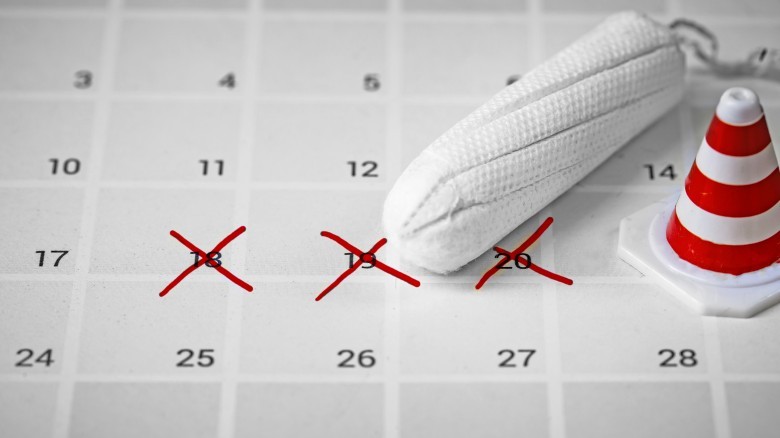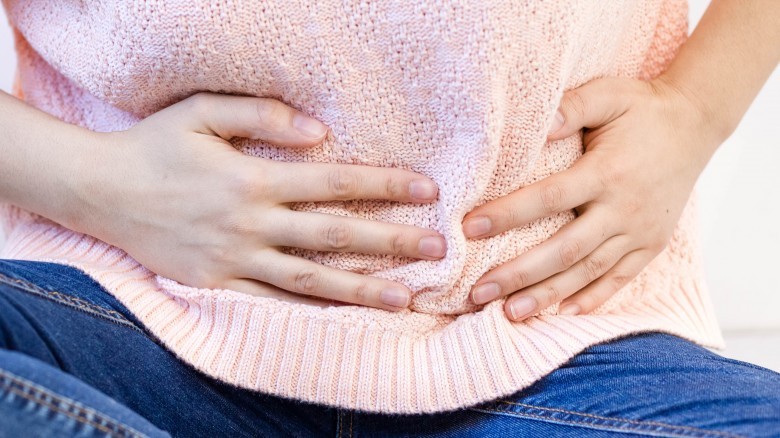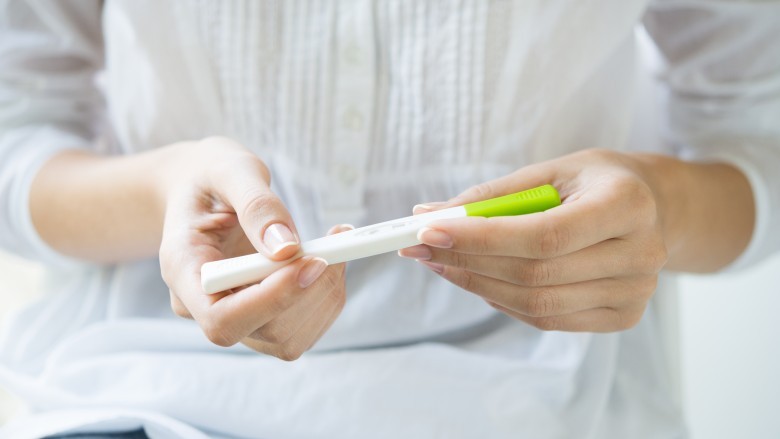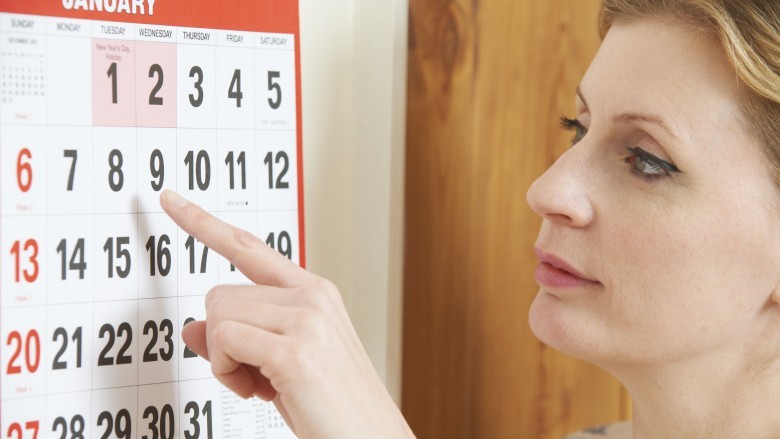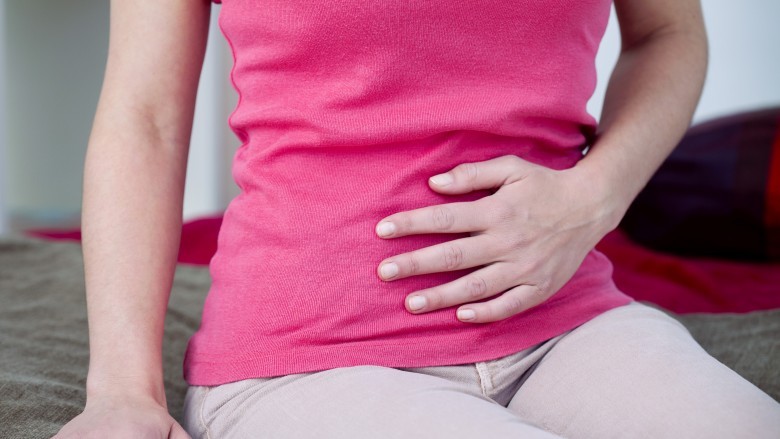What Your Period Reveals About Your Health
These days, most females get their first menstrual period when they're around 12 or 13 years old. Given that the average age for the onset of menopause is 51, according to the National Institute on Aging, most women are looking at nearly 40 years of monthly periods. That's more than 400 cycles. While it's normal for the same woman's cycle to change slightly throughout her life, some changes in a woman's menstrual cycle can signal that there may be something more going on with her health. Before you worry whether there's something wrong, you have to first know what's normal.
What is a healthy period?
According to the Office on Women's Health in the U.S. Department of Health and Human Services, periods can be light, moderate. They generally last from three to five days (but anywhere from two to seven days is normal) and are in the range of 21 to 35 days apart. If that sounds like a lot of variation to you, that's because it is. Every woman is different, and as such, every menstrual cycle is different. The good thing about having over 400 cycles in your lifetime, though, is that you get a chance to learn what is normal for you and can take note if there is a sudden change in your bleeding or cycle, or if you start experiencing other symptoms along with your period. Here's what different symptoms during your period may be telling you about your health.
Your period is lighter in color than normal
I spoke with Nicole Jardim, a certified women's health coach and the creator of Fix Your Period, who told me that your period color can say a lot. "Period blood that is too little, thinned out, lighter in color (kind of like watermelon juice or watered down cranberry juice) can indicate your estrogen is too low to build the uterine lining properly," she told me. This is important because low estrogen can also lead to irregular periods, vaginal dryness, low sex drive, hair loss, and hair thinning, while an appropriate uterine lining is essential to a healthy pregnancy.
You have excess pain
If you're experiencing severe cramping leading up to and during your period, the issue may be as simple as a magnesium deficiency. I spoke with Dr. Carolyn Dean, a women's health and nutrition expert, who told me this isn't all that uncommon because fluctuating sex hormones affect magnesium levels. "During the second half of the menstrual cycle, when both estrogen and progesterone are elevated, magnesium plummets," she said, adding this can lead to painful cramping. "Increasing dietary and supplemental magnesium can help relieve PMS-related cramping as well as low blood sugar, dizziness, fluid retention, and sugar cravings." While magnesium may help control cramping, there are other reasons you may be experiencing pain during your period. Uterine fibroids, which are non-cancerous growths in the uterus, can cause several concerning symptoms, including excess pain during your period, and may require treatment by your doctor. Endometriosis, in which the uterine lining begins to grow outside of the uterus, can also lead to excess pain during your period. Unfortunately, the causes of endometriosis pain can vary and aren't well understood, but hormone therapy prescribed by your doctor can help treat the pain.
You're bleeding more than usual
Heavy bleeding during a period is the most common presenting problem seen by gynecologists. While it may seem like this means you shouldn't worry about it, a sudden increase in bleeding during your period can be a sign you should see your doctor. Some sexually transmitted infections, including gonorrhea, may present with heavier bleeding during your period. Another cause of heavy bleeding may be endometriosis, whether or not you are experiencing excess pain. If your period is both heavier and less frequent than usual, you may want to talk to your doctor about hyperthyroidism, though only certain causes of hyperthyroidism result in heavier bleeding. Other causes of hyperthyroidism may actually result in light or missed periods. Regardless, if you are bleeding more than usual during your periods, it might be time to see your doctor.
You missed your period
While the most obvious sign of a missed period is pregnancy, there are many reasons why you may miss a period here and there. Anovulation, when you don't ovulate during your cycle, can also be caused by high stress because of the hormonal changes that occur when the hypothalamus is triggered and maintained by stressful situations. The double-edged sword here is that the more you worry about your missed period, the longer you may delay ovulation and your period. If you aren't feeling particularly stressed, but aren't getting much sleep for another reason, you may still be stressing these same hormones. For this reason, another cause of a missed period is sleep deprivation. Without adequate sleep, your body is unable to properly regulate hormones that lead to ovulation and the shedding of the uterine lining. So make yourself a mug of herbal tea, take a relaxing bath, and try to get some sleep.
You're bleeding between periods
Bleeding between periods can not only be frustrating (who wants that unexpected guest in the middle of the month?), it can also be worrisome. One of the most common causes of bleeding between periods, known as breakthrough bleeding, is completely harmless. This type of bleeding is light, often characterized as spotting, and is associated with the use of hormonal birth control. If you're concerned about breakthrough bleeding, you may consider talking to your doctor about switching to a different form of birth control, as that often helps. If, however, your mid-cycle bleeding is not related to hormonal birth control, this could be another sign your thyroid isn't behaving properly. In hypothyroidism (which leads to a slower metabolism), you might experience bleeding that is more frequent, including between your normal periods. Your doctor can order blood work to easily check all your hormone levels to help determine the cause of your bleeding so it can be addressed, if needed.
You have no idea when your period might come
If your period is very unpredictable and you never know when it might barge in uninvited, there may be a few things going on. If you've recently lost or gained a great deal of weight, your hormones may just be playing catch up. Changes in weight can cause changes in estrogen and testosterone, which can cause your period to be late or early. Another cause might be polycystic ovary syndrome (PCOS), which also causes hormone imbalances and metabolism problems. Depending on your age, an irregular period might be an early sign of menopause, particularly if your period is coming earlier each month and then you skip a month entirely. While menopause is a normal part of aging, some of the symptoms can be uncomfortable, and talking to your doctor during the early signs of menopause can help make it more manageable.
You're very bloated
According to the Mayo Clinic, bloating due to water retention can be a common symptom of your period, but it is important to be aware of any changes in the amount of bloating you experience. Unusual amounts of bloating, feelings of fullness, and pressure in the abdomen are the most common symptoms of ovarian cancer. Unfortunately, other symptoms of ovarian cancer, like back pain and lack of energy, may also be normal symptoms of your period. The key is to notice any dramatic changes in any of these symptoms and to discuss them with your doctor.
You're emotional
While you may think that being overly emotional is a normal sign of an impending period, many doctors of both Western and Eastern medicine don't consider this to be the norm. I spoke with Dr. De'Nicea Hilton, doctor of Oriental medicine, who suggested this could be a sign of something bigger. "Extreme anger, anxiety, or depression before a cycle is to start along with some cramping and sleep disturbances is associated with stagnation in the liver and some imbalances in the heart and kidney organ systems of Chinese medicine," she told me. She went on to note that anger, anxiety, and depression are also symptoms of premenstrual dysphoric disorder (PMDD) in Western medicine. PMDD is a severe form of premenstrual syndrome that can start seven to 10 days before your period starts and is generally accompanied by physical symptoms as well. If your emotions seem like a roller coaster and you're also experiencing things like severe breast tenderness, back pain, bloating, or other symptoms, talk to your doctor about PMDD.
Get to know Aunt Flo
With so many variations in what can be considered a normal period, and with many of those variations also serving as potential warning signs for diseases and disorders, how do you keep from stressing about every little change in your monthly cycle? While tracking which day you get your period may be part of your routine, if you aren't already tracking the other symptoms that go along with your period, you should start. By having a good sense of what's normal for you, you'll be better able to pinpoint if and when something abnormal happens. This kind of information can also help your doctor distinguish between a normal progression due to aging and something that should be taken more seriously. As much as you may dread Aunt Flo's visits, it may be time to get to know her a little bit better.

